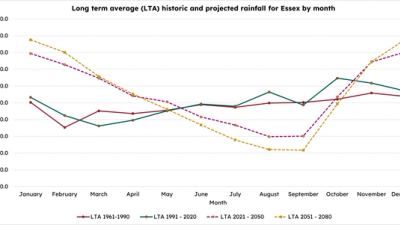Climate Change
Essex is already classified as a seriously water-stressed area. Water companies in the East of England predict that by 2050 we will only have 63% of the public water supply we need available.
If we do not take action to use less water and create more sources of water supply, shortages and restrictions will be a reality. Shortages will prevent new homes being built, new businesses being set up in Essex, and change the type of food that can be grown here.
Looking at data on the long-term average rainfall in Essex (Met Office UKCP), we can already see that in the past 30 years (1991-2020) there has been less rainfall in spring and more peaks in autumn and winter than during the 30 years previous to that (1961-1990). Less rainfall early in the year can be particularly problematic for agriculture.
Increased change in rainfall trends also directly affects the availability and dependency on groundwater (aquifer) sources. As our winters may continue to be wetter, and summers a lot drier, we need to adapt to store winter flows and floodwater when it is plentiful, to help ensure supplies are available when needed during other times of the year.

Hear from Professor Jules Pretty about how climate change is affecting us and the opportunities to change and adapt. The very recent report, Mission Zero: Independent Review of Net Zero also supports the need to manage water resources differently in the UK in future, and states that we must invest in nature restoration and protection as part of our plans for climate recovery and economic growth.